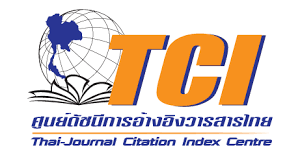ปัจจัยที่ส่งผลต่อกระบวนการตัดสินใจเดินทางท่องเที่ยวของนักท่องเที่ยวชาวไทยกลุ่มมิลเลนเนียล ภายหลังการผ่อนปรนมาตรการป้องกันโรคโควิด 19
คำสำคัญ:
ปัจจัยผลักดัน, ปัจจัยดึงดูด, กระบวนการตัดสินใจเดินทางท่องเที่ยว, กลุ่มมิลเลนเนียลบทคัดย่อ
งานวิจัยนี้มีวัตถุประสงค์เพื่อศึกษา (1) ปัจจัยผลักดัน ปัจจัยดึงดูด และกระบวนการตัดสินใจในการเดินทางท่องเที่ยว (2) ปัจจัยผลักดันที่มีอิทธิพลต่อกระบวนการตัดสินใจเดินทางท่องเที่ยว (3) ปัจจัยดึงดูดที่มีอิทธิพลต่อกระบวนการตัดสินใจเดินทางท่องเที่ยวของนักท่องเที่ยวชาวไทยกลุ่มมิลเลนเนียลภายหลังการผ่อนปรนมาตรการป้องกันโรคโควิด 19 กลุ่มตัวอย่างคือ นักท่องเที่ยวชาวไทยกลุ่มมิลเลนเนียล 385 คน รวบรวมข้อมูลโดยแบบสอบถามออนไลน์ วิเคราะห์ข้อมูลด้วยสถิติ ร้อยละ ค่าเฉลี่ย ส่วนเบี่ยงเบนมาตรฐาน และการวิเคราะห์การถดถอยแบบพหุคูณ ผลการวิจัยพบว่า (1) ปัจจัยผลักดันโดยรวมนั้นอยู่ในระดับสูง (2) ปัจจัยดึงดูดโดยรวมนั้นอยู่ในระดับสูง (3) กระบวนการตัดสินใจท่องเที่ยวโดยรวมอยู่นั้นในระดับสูง (4) ปัจจัยผลักดันที่มีอิทธิพลต่อกระบวนการตัดสินใจเดินทางท่องเที่ยวของนักท่องเที่ยวชาวไทยกลุ่มมิลเลนเนียล ภายหลังการผ่อนปรนมาตรการป้องกันโรคโควิด 19 คือ ตัวแปรด้านความต้องการด้านสังคม ความต้องการพบเจอสิ่งใหม่ ๆ ความต้องการด้านร่างกาย และความต้องการเรียนรู้วัฒนธรรม และ (5) ปัจจัยดึงดูดที่มีอิทธิพลต่อกระบวนการตัดสินใจเดินทางท่องเที่ยวของนักท่องเที่ยวชาวไทย กลุ่มมิลเลนเนียล ภายหลังการผ่อนปรนมาตรการป้องกันโรคโควิด 19 คือ ตัวแปรด้านผลิตภัณฑ์ ด้านราคา และด้านช่องทางการจัดจำหน่าย โดยมีระดับนัยสำคัญทางสถิติที่ระดับ 0.01 ดังนั้น ผู้ประกอบการภาคการท่องเที่ยวควรให้ความสำคัญกับการออกแบบและพัฒนาผลิตภัณฑ์ทางการท่องเที่ยว การกำหนดราคาทางการท่องเที่ยวที่เหมาะสม และช่องทางจำหน่ายผลิตภัณฑ์ทางการท่องเที่ยวเพื่อกระตุ้นความต้องการเดินทางท่องเที่ยวของชาวไทยกลุ่มมิลเลนเนียล
เอกสารอ้างอิง
กองเศรษฐกิจการท่องเที่ยวและกีฬา. (2563). สถานการณ์การท่องเที่ยวเดือนธันวาคม 2563. สืบค้นเมื่อ 20 สิงหาคม 2565, จาก https://www.mots.go.th/download/article/article_20210217155048.pdf
กัญญารัตน์ บุญนำ. (2565). ปัจจัยที่ส่งผลต่อการตัดสินใจท่องเที่ยวพิพิธภัณฑ์รอบเกาะรัตนโกสินทร์ กรณีศึกษาคนเจเนอเรชัน Y. วารสารสวนสุนันทาวิชาการและวิจัย, 16(2), 44-59. https://so05.tci-thaijo.org/index.php/ssajournal/article/view/257567
ฉัตรชัย อินทสังข์ และ ดุษฎี เทียมเทศ บุญมาทรงสูง. (2562). การศึกษาพฤติกรรมและการตัดสินใจของนักท่องเที่ยวเชิงชุมชน กลุ่มมิลเลนเนียล: กรณีของบ้านด่านเกวียน จังหวัดนครราชสีมา. วารสารศิลปศาสตร์และวิทยาการจัดการ มหาวิทยาลัยเกษตรศาสตร์, 6(1), 1-12. https://kuojs.lib.ku.ac.th/index.php/jfam/article/view/3060
ชัยพร ศุภนิมิตวิเศษกุล และ ชวลีย์ ณ ถลาง. (2565). ปัจจัยส่วนประสมการตลาดการท่องเที่ยว ภายใต้วิกฤติโควิด19. วารสารร่มพฤกษ์ มหาวิทยาลัยเกริก, 40(2), 69-88. https://romphruekj.krirk.ac.th/docs/romphruek-journal-ปีที่-40-ฉบับที่-2
ชัยวุฒิ ชัยฤกษ์ และ เสรี วงษ์มณฑา. (2562). ปัจจัยการตัดสินใจของนักท่องเที่ยวชาวไทยที่เดินทางท่องเที่ยวในเขตเศรษฐกิจพิเศษตาก. วารสารการบริการและการท่องเที่ยวไทย, 14(1), 16-27.
ทัศนียา กิตติภาคย์พฤทธ์, ฑัตษภร ศรีสุข, และ อัศนีย์ ณ น่าน. (2563). พฤติกรรมนักท่องเที่ยวและปัจจัยส่วนประสมตลาดบริการที่มีผลต่อการตัดสินใจท่องเที่ยวแหล่งท่องเที่ยวเชิงวัฒนธรรมในจังหวัดลำปาง. วารสารวิจัยมหาวิทยาลัยเวสเทิร์น มนุษยศาสตร์และสังคมศาสตร์, 6(3), 72-84. https://so04.tci-thaijo.org/index.php/WTURJ/article/view/254841
ทินกร สุมิพันธ์ และ กิตติ แก้วเขียว. (2563). ปัจจัยส่วนประสมการตลาดและอุปสงค์การท่องเที่ยวที่ส่งผลต่อพฤติกรรมการตัดสินใจของนักท่องเที่ยวที่เดินทางมาท่องเที่ยวหมู่บ้านคีรีวง จังหวัดนครศรีธรรมราช. วารสารการบริหารและจัดการ, 10(2), 1-13.
นรพล เกตุทัต. (2557). แรงจูงใจการท่องเที่ยวและการแบ่งกลุ่มตลาดนักท่องเที่ยวชาวยุโรปที่เดินทางมาท่องเที่ยวกรุงเทพมหานคร (วิทยานิพนธ์ศิลปศาสตร์มหาบัณฑิต). มหาวิทยาลัยธุรกิจบัณฑิตย์.
นิมิต ซุ้นสั้น. (2562). การวิเคราะห์แรงจูงใจของนักท่องเที่ยวชาวไทยที่เดินทางมาถนนวัฒนธรรม กรณีศึกษาถนนวัฒนธรรมหลาดใหญ่ จังหวัดภูเก็ต. วารสารวิชาการ มหาวิทยาลัยหอการค้าไทย มนุษยศาสตร์และสังคมศาสตร์, 39(2), 16-31. https://utcc2.utcc.ac.th/utccjournal/journal_book.php?journal_id=59
พุทธศักดิ์ กำจร และ จินณพัษ ปทุมพร. (2565). แบบจำลองสมการเชิงโครงสร้างที่ส่งผลต่อการตัดสินใจเดินทางท่องเที่ยววิถีเมืองของกลุ่มมิลเลนเนียลในจังหวัดขอนแก่น. วารสารบริหารธุรกิจและการบัญชี มหาวิทยาลัยขอนแก่น, 6(1), 68-93. https://so04.tci-thaijo.org/index.php/kkbsjournal/article/view/249097
รวีวรรณ โปรยรุ่งโรจน์. (2558). พฤติกรรมนักท่องเที่ยว. กรุงเทพมหานคร: โอเดียนสโตร์.
วนิดา เลิศพิพัฒนานนท์. (2561). รูปแบบพฤติกรรมและแรงจูงใจในการท่องเที่ยวของคนไทย Gen Y. วารสารวิทยาลัยดุสิตธานี, 12(ฉบับพิเศษ), 134-149. https://so01.tci-thaijo.org/index.php/journaldtc/article/view/129537
วรากร คำปลิว, บังอร ฉัตรรุ่งเรือง, และ ศุภฤกษ์ ธาราพิทักษ์วงศ์. (2559). ปัจจัยที่มีผลต่อการตัดสินใจเดินทางท่องเที่ยวแบบผจญภัยของนักท่องเที่ยวชาวไทยและชาวต่างชาติในจังหวัดเชียงใหม่. พิฆเนศวร์สาร, 12(2), 139-148. https://so01.tci-thaijo.org/index.php/pikanasan/article/view/99007
สถาพร เกียรติพิริยะ และ วิทิดา นาคสุข. (2563). ปัจจัยที่ส่งผลต่อการตัดสินใจท่องเที่ยวในช่วงวันหยุดสุดสัปดาห์และวันหยุดต่อเนื่องของคนวัยทำงาน. วารสารมหาจุฬานาครทรรศน์, 7(12), 178-196. https://so03.tci-thaijo.org/index.php/JMND/article/view/249105
สรวงรักษ์ จารุสมบัติ. (2565). ปัจจัยที่มีผลต่อการตัดสินใจเลือกไปท่องเที่ยวจังหวัดเชียงใหม่ของนักท่องเที่ยวชาวไทย กลุ่มเจนเนอเรชั่นวาย ในช่วงการแพร่ระบาดของโรคติดเชื้อไวรัสโคโรนา 2019 (การศึกษาค้นคว้าอิสระศิลปศาสตร์มหาบัณฑิต). มหาวิทยาลัยกรุงเทพ.
สำนักบริหารการทะเบียน กรมการปกครอง. (2565). สถิติประชากร. สืบค้นเมื่อ 1 ตุลาคม 2565, จาก https://stat.bora.dopa.go.th/stat/statnew/statMONTH/statmonth/#/mainpage
สิริญญา ชาติเผือก และ บุญญรัตน์ สัมพันธ์วัฒนชัย. (2563). ปัจจัยที่ส่งผลต่อการตัดสินใจเลือกสถานที่ท่องเที่ยวของนักท่องเที่ยวชาวไทยต่ออุทยานแห่งชาติเขาใหญ่ จังหวดนครราชสีมา และอุทยานแห่งชาติดอยอินทนนท์ จังหวัดเชียงใหม่. วารสารวิทยาลัยดุสิตธานี, 13(2), 134-153. https://so01.tci-thaijo.org/index.php/journaldtc/article/view/241054
สิรินี ว่องวิไลรัตน์. (2560). พฤติกรรมผู้บริโภค. สืบค้นเมื่อ 30 สิงหาคม 2565, จาก https://online.northern.ac.th/moodle/pluginfile.php/16269/mod_resource/content/2/พฤติกรรมผู้บริโภค.pdf
Cochran, W. G. (1977). Sampling Techniques (3rd ed). New Jersey: John Wiley & Sons.
Dann, G. M. S. (1977). Anomie, ego-enhancement and tourism. Annals of Tourism Research, 4(4), 184-194. https://doi.org/10.1016/0160-7383(77)90037-8
Hair, J. F., Black, W. C., Babin, B. J., & Anderson, R. E. (2010). Multivariate Data Analysis (7th ed.). New York: Pearson.
Hasan, M. M., & Islam, M. F. (2020). The Effect of Marketing Mix (7Ps’) on Tourists’ satisfaction: A study on Cumilla. The Cost and Management, 48(2), 30-40.
Ketter, E. (2020). Millennial travel: tourism micro-trends of European Generation Y. Journal of Tourism Futures, 7(2), 192-196. https://doi.org/10.1108/JTF-10-2019-0106
Kotler, P. (2002). Marketing Management Millenium Edition (10th ed.). United States of America: Pearson.
Kusumaningrum, D. A., & Wachyuni, S. S. (2020). The shifting trends in travelling after the COVID 19 pandemic. International Journal of Tourism & Hospitality Reviews, 7(2), 31–40. https://doi.org/10.18510/ijthr.2020.724
Liu, Z., Zhu, L., Roberts, R., & Tong, W. (2019). Toward Clinical Implementation of Next-Generation Sequencing-Based Genetic Testing in Rare Diseases: Where Are We?. Trends Genet, 35(11), 852-867. https://doi.org/10.1016/j.tig.2019.08.006
Lu, R., Zhao, X., Li, J., Niu, P., Yang, B., Wu, H., ... & Tan, W. (2020). Genomic characterisation and epidemiology of 2019 novel coronavirus: implications for virus origins and receptor binding. The lancet, 395(10224), 565-574. https://doi.org/10.1016/S0140-6736(20)30251-8
Potti, A. M., Nair, V. K., & George, B. (2023). Re-Examining the Push-Pull Model in Tourists’ Destination Selection: COVID-19 in the Context of Kerala, India. Academica Turistica-Tourism and Innovation Journal, 16(2), 173-189. https://academica.turistica.si/index.php/AT-TIJ/article/view/453
Prihatin, E., & Syahnur, M. H. (2020). Marketing Mix Practice Theory on Tourism Decision Makingin Makassar City. IOSR Journal of Humanities And Social Science (IOSR-JHSS), 25(7), 38-42.
Strauss, W., & Howe, N. (1991). Generations: The History of America's Future, 1584–2069. New York: Quill.
Vicki, G. (2017). Travel Research: 2018 Travel Trends. Retrived 25 August 2022, from https://www.aarp.org/pri/topics/social-leisure/travel/2018-travel-trends






